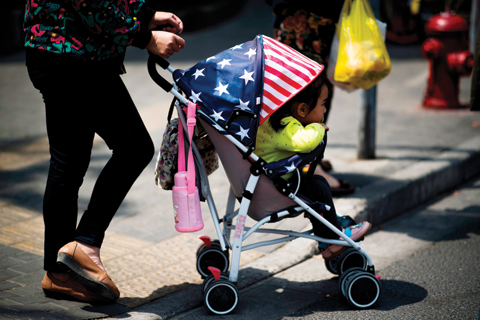Beijing may scrap limit on number of children
SHANGHAI: A woman pushes a child in a stroller, adorned with colors of the US national flag, along a street in Shanghai. China appears poised to scrap its two-child policy, with a state-run newspaper yesterday citing a draft civil code that would overhaul decades of controversial family-planning rules. — AFPBEIJING: China's ruling Communist Party has issued a revised set of regulations governing members' behavior, threatening punishment for spreading political rumors and recommending those who cling to religious beliefs be asked to leave the party. President Xi Jinping's on-going crackdown against deep-rooted corruption, begun six years ago when he took office, has shaken up the party, with Xi warning, like other leaders before him, that the party's very survival is at stake. Xi has accrued more power than any of his immediate predecessors and has intensified efforts to ensure cadres are loyal, disciplined, upright and honest.
The updated discipline rules, released late on Sunday by the graft watchdog the Central Commission for Discipline Inspection but in effect from Aug 18, put into written form many orders that are in practice already in effect. In the most serious cases where a law has been broken, party members can be prosecuted, but in many cases the most severe punishment that can be meted out is expulsion from the party. Xi's name has also been written into the revised rules, as it is already in the party and country's constitution, putting him at the very centre of party life.
Party members are not allowed to speak out against central party policies or decisions, and nor can they spread "political rumors or damage the party's unity", the new rules say. "Party members and officials must correctly exercise the power granted them by the people, be clean and upright, and oppose any abuse of power or behavior that seeks personal benefit," one new clause says. Another new clause takes aim at party members who are also religious. While the country's constitution guarantees freedom of religion the party is officially atheist and party members are supposed to be too.
"Party members who have religious belief should have strengthened thought education. If they still don't change after help and education from the party organization, they should be encouraged to leave the party," the new rules say. Those who attend "activities that use religion for incitement" will be expelled, according to the rules. Another new clause calls for punishment who "distort" the history of the country, rather than just party or military history as before. History is a sensitive subject in China as so much of the party's legitimacy rests on its position as claiming great historical achievements, such as leading China to victory over Japan before and during World War Two.
Number of children
China appears poised to scrap the limit on the number of children couples can have, with a state-run newspaper yesterday citing a draft civil code that would end decades of controversial family planning policies. The wide-ranging code would get rid of a policy that has been enforced through fines but was also notorious for cases of forced abortions and sterilization in the world's most populous country. The Procuratorate Daily said the code omits any reference to "family planning"-the current policy which limits couples to having no more than two children.
The draft code would go to a vote at the rubber-stamp legislature, the National People's Congress, in 2020. The Communist Party began enforcing a one-child policy in 1979 to slow population growth. The limit was raised to two children in 2016 as the nation scrambled to rejuvenate its greying population of some 1.4 billion. Concerns are mounting that an ageing and shrinking workforce could slow down its economy, while gender imbalances could lead to social problems.
Childbirths have not increased as much as forecast since the two-child policy came into force, and there has been rising speculation the government will further ease restrictions. The draft code was discussed at a meeting of the Standing Committee of the National People's Congress, a powerful body of lawmakers headed by President Xi Jinping, that will run till Friday. Other proposed changes include a one-month cooling off period before a divorce, during which either party can withdraw their application. News of the proposed changes lit up social media. "So they want us to have more babies and less divorces?" wrote one user on the Twitter-like Weibo platform.
Speculation about a change grew this month after a government-issued postage stamp for the Year of the Pig in 2019 showed a porcine family complete with three piglets. Under the one-child restrictions those with multiple children were heavily fined. Some women were forced to undergo abortions while others were subjected to forced sterilizations. Exemptions were given to ethnic minorities like Uighurs and Tibetans and those living in rural areas if their first child was a girl. Couples who themselves were only children could apply to have additional children.
But couples have been in no rush to start larger families since the policy was loosened, with 17.9 million babies born in 2016, just 1.3 million more than in the previous year and half of what was expected, according to the National Bureau of Statistics. Births in 2017 even slipped to 17.23 million, well below the official forecast of over 20 million. Two Chinese academics caused a social media storm earlier this month when they proposed that couples with one or no children should pay into a tax-like "maternity fund".- Agencies



